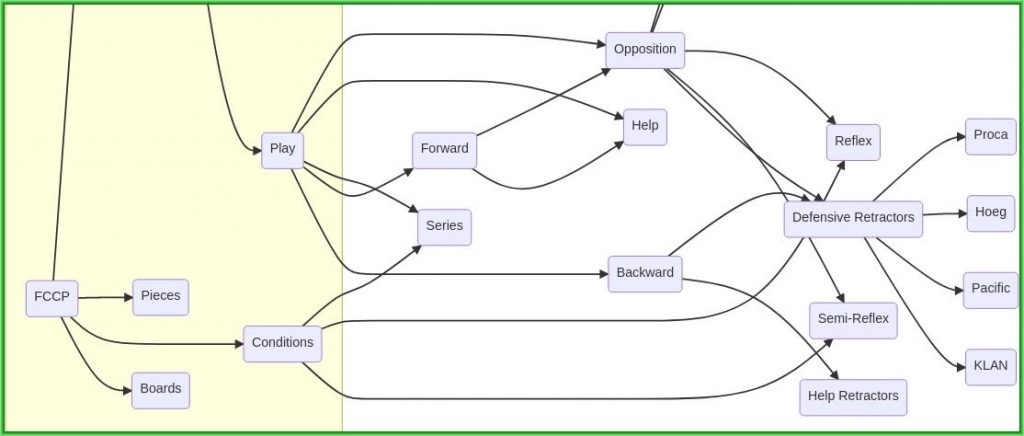
This time, we have:
- A revised version of the “Tree and Leaf” article, based on additional information from Peter Wong
- Maryan Kerhuel’s revised documents on the classification of fairy conditions: document, Spreadsheet with list of elements
- Maryan Kerhuel’s documents on the classification of fairy pieces: document, Spreadsheet with list of elements
- A sneak peek at the future unified model (see the image!), with multiple categories for the same element or group.
Happy Reading! – Shankar Ram


Great work by Shankar
Great compilation and structure work! As I’m not sure if you intend to compile rather “complete” listings, here are some comments. I browsed the different sections of the FCCP glossary (Tabular VIEW), but I could not find the following fairy pieces/conditions (all referring to “Sources: Die Schwalbe Lexicon”):
a) fairy pieces in section 2:
– Mulehopper (like Grasshopper, but kicking back the hurdle)
– Dobrich Hopper (compare with Bul piece)
– 2-L (Bishop rider with doublefield start)
– W-T (rook rider on white-fields only)
– Leapers 0:3 (Dromedar), 2:4 (Lancer), 3:3 (Gecko), 4:4 (Commutor)
– Riders 2:2 (Alfilrider), 3:3 (Geckorider)
– x:y-Darters
– compound riders: Ubi-Ubi, Asper, Marsupial, Hemione, Oogaplex, double-move Queen, etc…
– limited riders: Minotaurus, Tricornus, etc…
– Griffon (S or double-S) [different from Gryphon/Griffin]
– Mirror
b) fairy conditions in section 3:
– Restriktor, Restriktorfeld (limiting move lengths selectively)
– Distancer (Dister)
– Breton chromatique (adverse)
– Symmetric Teleportation field
– Verwallschach
– Warp Chess
CIRCE Variants (some with Anti-variants):
– Bedrichscirce
– Circe Satellite
– Bumerangcirce
– Chamaeleoncirce (with subvariants)
– further subvariants of Equipollentscirce
– Circe intensive
– Circe inverse
– Circe diabolique
– Circe zentripedal
– Circe monochrome
– Rankcirce
– Atomic Circe
– Contracirce
– Contact Circe
– Eigencirce
– Itemcirce
– Circe Cohabitant
– Circe Quartirant
– Augsburger Circe Spray
– Teleskopcirce (Billardcirce, Pongracz Circe)
– Football Circe
– Alternate Circe
– Hydracirce
– Cannibal Circe
– Mutant Circe
– Promotion Circe (with subvariants)
– Circe Koeko, t&m-Circe / Circe-t&m
– Andernacher Circe
– Alsatian Mirror Circe
– Simple Anticirce
– Antipodean Marscirce, Marsfilecirce, PWC Marscirce, vertically symmetric Marscirce
– Antimars Mirrorcirce, Antipodean Antimarscirce
– Paracirce (and many variants)
– Circe Jovien (and main variants: diagram, mirror, Cuckoo)
– Paracirce Jovien (and main variants: diagram, mirror, Cuckoo)
Thanks for your interest, Walter!
Though we have covered more than 90% of the elements supported by Popeye and a majority of the most frequently used elements supported by WinChloe, there are still many gaps that need to be filled. We do intend to compile as well as complete! See my articles on Tree and Leaf hoppers, and on Reciprocal stipulations. All the elements you list will eventually be added. But in some cases, we have to decide about elements for which no example problems exist.
Amazed that there are so many Circe variants. Many i did not know. One can easily get bamboozled ?
Most of the various Circe conditions have not been put in « sub boxes » so far inside the main box described in chapter 5. of the article « Fairy Conditions ».
Is someone volunteering to affect these conditions to the already existing sub chapters 5.1 .1 to 5.1.5 and 5.2?
Maryan: Ok, I’d like to give it a try in the next days. To where should I send a draft and in what text format – or just post it here?
As far as I understand, the idea is to assign these Circe conditions to the already existing structures 5.1.1 … in document “Taxonomy of Fairy Chess rules 04.04.22, Chapter: fairy conditions”. Just the structure, no textual explanations, nor characteristics in overview, … or…?
So, this would then be fully independent of the (possibly later following?) textual entries in “Glossary of Fairy Chess Elements: Tabular VIEW”, in its chapters “3.2 Rebirth after Capture Effects”, and “3.7. Other Concepts”?
Yes Walter, this is the idea: each Circe condition should be assigned to one of the chapters 5.1.1 to 5.1.5. And maybe you will have to introduce additional chapters!
The result could consist in two Excel files with at least two columns , one showing the name of the Circe condition, one the identification of the suitable chapter attributed to the condition, you may add new columns for your comments. One of the file would be sorted by condition name, the other by chapter number. When ready, the best is to send them to Shankar, who can organize with Julia the publication on the site. This is how things went on for my files, and I take the liberty to suggest the same procedure. But of course Shankar and Julia might well organize something else.
Note that the same work should be undertaken for Antitcirce conditions!
Maryan: ok, thanks! That’s fine for me.
Walter,
We are happy to welcome you to the project.
Please send a test mail to nshram at gmail dot com.
I will pass it on to Maryan as well.
We do have a google group as well which is mostly inactive. But I or Julia will add you to it. You can go through the early posts.
I think something like ‘Stoppable’ or ‘Non-stoppable’ should be a property separate from the piece, just like royal or hurdlecolourchanging.
Joost,
Thank you!
What you are referring to is an attribute. Quoting from Maryan’s recent document: “…an attribute is simply a condition applied to some pieces on the diagram, not to all of them.”
“Stoppable” and “Non-stoppable” are attributes which were applied to Equihoppers, and more recently to the family of Tree and Leaf hoppers, in my recent article.
Some attributes could also be considered as options. In the same article quoted above, Maryan calls this “…a concept which could be used systematically to separate conditions differing on minor points.” Perhaps, the same could be applicable to pieces too.
I am not too sure that stoppable and not stoppable should (for the time being) enter the list of attributes like royal etc because these two characteristics are specific of equihoppers. Therefore (for the time being) these specifications should just be part of the definition of the march of each equihopper
After all it is seems adequate to extend the notion of option, already existing for conditions (example: option « strict »), to the description of the march of pieces. A variety of options could exist. Joost has cited stoppable and unstoppable equihoppers. Other examples: number of steps allowed to piece, following the definition of its march; angle between steps made by a zigzag rider, etc Options avoid the multiplication of names